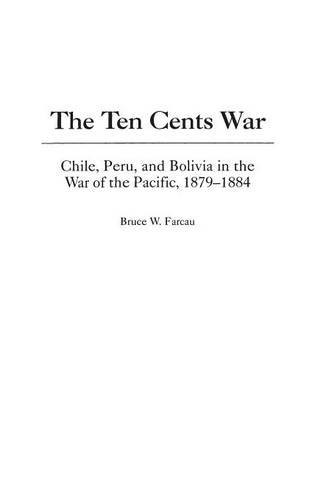
The Ten Cents War: Chile, Peru, and Bolivia in the War of the Pacific, 1879-1884
(Hardback)
Publishing Details
The Ten Cents War: Chile, Peru, and Bolivia in the War of the Pacific, 1879-1884
By (Author) Bruce W. Farcau
Bloomsbury Publishing PLC
Praeger Publishers Inc
30th September 2000
United States
Classifications
Tertiary Education
Non Fiction
Battles / military campaigns
983.0616
Physical Properties
Hardback
224
Width 156mm, Height 235mm
539g
Description
The Atacama Desert, a coastal area where the borders of Chile, Peru, and Bolivia meet, was a region of little interest in the late nineteenth century until European research on the use of nitrates in fertilizers and explosives rendered the droppings of millions of sea birds a valuable commodity. In a move that echoed the California Gold Rush, the three neighboring countries soon battled for control of the region. In 1879, a comparatively modern and powerful Chile seized Bolivia's coastal province, and a secret alliance between Peru and Bolivia soon led to a full-scale war, one which saw the employment of much new military technology. Using such new weapons as the breech-loading rifle, rapid-fire cannon, ironclad warships, torpedoes, and electronic mines, Chile quickly crushed the allied armies, but a guerrilla war would drag on for years. While the three armies fought over some of the most inhospitable terrain imaginable, from burning, waterless deserts to snow-clogged mountain passes at 15,000 feet, their governments bumbled and wrangled. In the end, the lure of easy wealth undermined the economies of all three nations and served no good purpose when the market for nitrates soon evaporated, leaving all three much poorer for the experience.
Reviews
.,."a valuable addition to the study of nineteenth century Latin American history."-South Eastern Latin Americanist
.,."a very welcome work for anyone interested in the military history of the nineteenth century, as well as relations among Latine American states, on which the confict continues to have an impact....does a very good job of examining strategic planning, campaigns, and a number of individual actions."-The NYMAS Newsletter
.,."interesting and well-written...the book provides a good introduction to the War of the Pacific, covering the political and economic aspects quite well...a good starting poing for those interested in the war and Chile's nineteenth-century domination of the west coast of South America."-The Journal of Military History
...a valuable addition to the study of nineteenth century Latin American history.-South Eastern Latin Americanist
...a very welcome work for anyone interested in the military history of the nineteenth century, as well as relations among Latine American states, on which the confict continues to have an impact....does a very good job of examining strategic planning, campaigns, and a number of individual actions.-The NYMAS Newsletter
...interesting and well-written...the book provides a good introduction to the War of the Pacific, covering the political and economic aspects quite well...a good starting poing for those interested in the war and Chile's nineteenth-century domination of the west coast of South America.-The Journal of Military History
[i]n the works discussed herein. As a corpus these works are significant because they raise questions for future students of military-civilian relations...Such contrasts and comparisons make this body of work historiographically noteworthy as well...Each is a refreshing corrective to national versions that extolled the virtues of things matial, made nationalistic claims, and doted on the technicalities of military history, all the while ignoring the ugly side of war and its aftermath...Smallman's Fear and Memory confirms this on a case-study level. Centeno's and Smallman's works complement each other neatly, as do Vale's, Whigham's, and Farcau's; and Brahm's, Rauch's, Arancibia's, and Sater's and Herwig's. _-Latin American Review
"in the works discussed herein. As a corpus these works are significant because they raise questions for future students of military-civilian relations...Such contrasts and comparisons make this body of work historiographically noteworthy as well...Each is a refreshing corrective to national versions that extolled the virtues of things matial, made nationalistic claims, and doted on the technicalities of military history, all the while ignoring the ugly side of war and its aftermath...Smallman's Fear and Memory confirms this on a case-study level. Centeno's and Smallman's works complement each other neatly, as do Vale's, Whigham's, and Farcau's; and Brahm's, Rauch's, Arancibia's, and Sater's and Herwig's. _"-Latin American Review
..."a valuable addition to the study of nineteenth century Latin American history."-South Eastern Latin Americanist
..."a very welcome work for anyone interested in the military history of the nineteenth century, as well as relations among Latine American states, on which the confict continues to have an impact....does a very good job of examining strategic planning, campaigns, and a number of individual actions."-The NYMAS Newsletter
..."interesting and well-written...the book provides a good introduction to the War of the Pacific, covering the political and economic aspects quite well...a good starting poing for those interested in the war and Chile's nineteenth-century domination of the west coast of South America."-The Journal of Military History
"[i]n the works discussed herein. As a corpus these works are significant because they raise questions for future students of military-civilian relations...Such contrasts and comparisons make this body of work historiographically noteworthy as well...Each is a refreshing corrective to national versions that extolled the virtues of things matial, made nationalistic claims, and doted on the technicalities of military history, all the while ignoring the ugly side of war and its aftermath...Smallman's Fear and Memory confirms this on a case-study level. Centeno's and Smallman's works complement each other neatly, as do Vale's, Whigham's, and Farcau's; and Brahm's, Rauch's, Arancibia's, and Sater's and Herwig's. _"-Latin American Review
Author Bio
BRUCE W. FARCAU is a twenty-year veteran of the Foreign Service with numerous assignments in Latin America and Europe./e He has published extensively on Latin American Military History and Politics.
